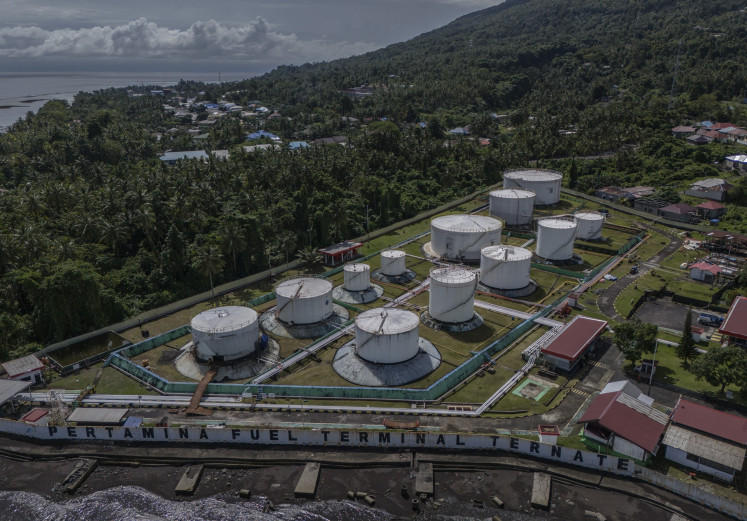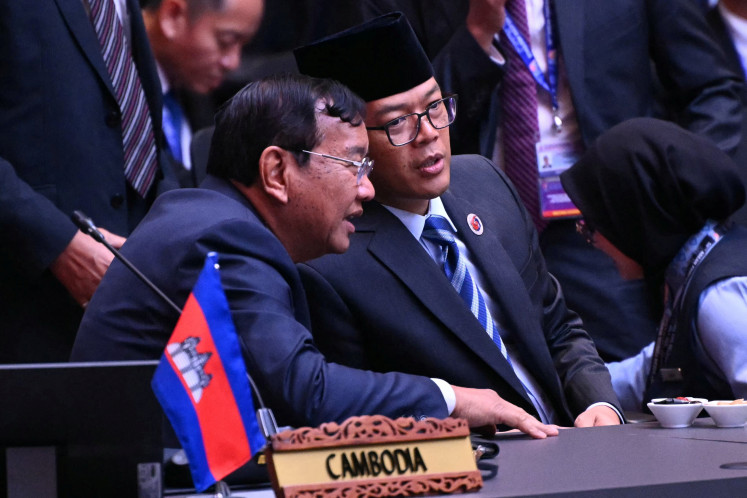Popular Reads
Top Results
Can't find what you're looking for?
View all search resultsPopular Reads
Top Results
Can't find what you're looking for?
View all search resultsYouth Pledge Day: Youth and the faith of our planet
This transition is happening now. Youth-led, eco-responsible businesses are proliferating across the nation.
Change text size
Gift Premium Articles
to Anyone
A
s the world’s fourth-most populous nation with a significant demographic dividend, Indonesia has yet to balance its human and economic development with sustainable natural resources management. From mobilizing innovative eco-oriented business models, to taking on social media by storm with critiques of certain developmental plans, the youth is front and center in addressing this immense challenge.
There could not be a more timely moment to commemorate the impactful youth movement than Youth Pledge Day on Oct. 28, which reminds the young generations of Indonesia to revamp their contributions to this country and planet.
On Oct. 28, 1928, youth representatives from many islands of the then-Dutch East Indies vowed to recognize only “one Indonesian motherland, one Indonesian people, and one Indonesian language”. It was a patriotic and symbolic response by the youth to show their leadership in addressing challenges during that era.
The challenges faced by millennials and Generation Z are enormous. We have a decade to cut global emissions to avoid catastrophic warming of our planet. Biodiversity, the very foundation of our biosphere, societies and economies, is declining at an unprecedented rate in the planet’s history. We have managed to push the processes that regulate the stability and resilience of the Earth system (“planetary boundaries”, as coined by leading scientists) beyond its capacities.
These scientists argue that if we cross more of these boundaries, we increase the risk of generating irreversible environmental changes. If we can maintain a healthy planet, however, we surely can continue to develop and thrive for generations to come.
Transitioning to a regenerative and ecologically resilient economy offers immense opportunities. The World Economic Forum in a recent report highlights how a new nature economy can lead to business value creation of US$10 trillion and create over 390 million jobs by 2030, and the youth is the engine of this transition.
This transition is happening now. Youth-led, eco-responsible businesses are proliferating across the nation.
Take coffee, for example. Youth-led coffee shops have been booming in recent years. Their responsible sourcing attitude has signaled the needs for the production of commodities that also lead to reduction of poverty among farmers, and strengthening resilience of production during periods of environmental stress, such as during flooding or intense drought.
This, nevertheless, is not sufficient and the youth business model needs to also reach out to the upstream of such commodities due to the fact that Indonesia has a low level of coffee productivity. With the average per capita consumption standing at 0.6 kg and the national average of coffee production at around 0.75 kg per hectare per year, Indonesia might become a net importer of coffee soon enough.
Hence, the success of the youth business model in the downstream sector of commodities needs to be replicated in the upstream. Scaling up youth-led responsible-coffee businesses, however, is not without challenging realities.
As reported in “Brewing up climate resilience in the coffee sector” by IDH-Sustainable Trade Initiative and partners, production of coffee will likely face additional challenges including increased water stress and outbreaks of pests and diseases.
With significant involvement and leadership of the youth of today and tomorrow, certain local chains and operators have made efforts to find breakthroughs that connect productivity with concrete solutions to climate adaptation in the coffee and agricultural sectors, including crop diversification and utilization of big data.
Scaling up such breakthroughs, however, can only occur if millennials believe that business and investment models in the agricultural sector can provide a profit, prestigious position or have a positive societal impact. To make this happen, appropriate policies and finance from the current government and private sector to stimulate such development is needed.
Youth-led innovations have also solidified a business model focusing on ecosystem protection and restoration. Facilitated by the government’s policy on ecosystem restoration concessions and social forestry, companies led by the youth have secured land to protect natural ecosystems and restore degraded peatland.
In turn, sustainable commodities and ecosystem services are generated and channeled to national and multinational businesses with climate and biodiversity commitments. These businesses generate positive biodiversity outcomes alongside financial returns.
In general, models of development or doing business that respect and even incorporate climate change strategies, biodiversity management and conservation require fresh minds and new thinking, two of many qualities that young people have.
More than 90 years since the Youth Pledge, the youth of today and tomorrow are presented with developmental and environmental challenges related to the rich natural capital and demographic dividend of Indonesia. To solve such challenges, we need to include, empower and work with the youth, so that they can in turn create appropriate business models and cutting-edge interventions.
Like in the 1920s, if and when the youth stand united and start working together for a good cause, things will change for the better.
***
Fitrian Ardiansyah is executive chairman of Inisiatif Dagang Hijau (IDH) Sustainable Trade Initiative in Indonesia. Pratiwi Utamiputri is a business development and biodiversity expert.










